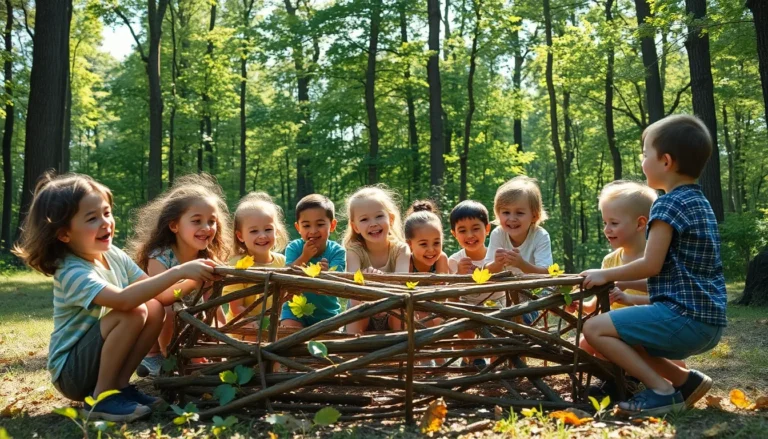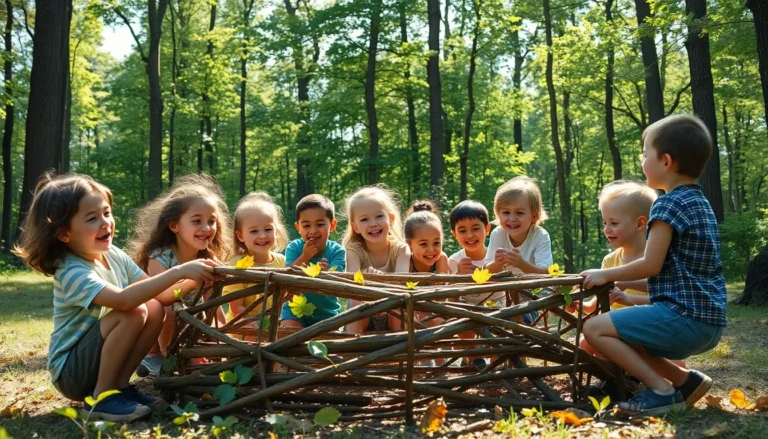Table of Contents
ToggleIn a world where emojis often replace actual words, mastering social skills might feel like trying to solve a Rubik’s Cube blindfolded. Yet, these skills are the secret sauce that can turn awkward encounters into smooth conversations. Whether it’s navigating a networking event or simply chatting with a neighbor, knowing how to connect with others is essential for success.
Imagine strolling into a room full of strangers with the confidence of a catwalk model. Social skills development is about more than just making small talk; it’s about building relationships, boosting self-esteem, and even enhancing career prospects. So, buckle up and get ready to explore the art of social interaction. Who knew that learning to communicate effectively could be this much fun?
Importance Of Social Skills Development
Social skills development plays a vital role in personal and professional environments. Mastering these skills fosters effective communication and helps navigate various social situations. Enhanced social abilities promote stronger relationships, essential for both personal growth and workplace dynamics.
Effective social skills improve self-esteem. Individuals who can engage confidently with others experience greater satisfaction in social settings. Higher self-esteem correlates with increased willingness to participate in group activities, leading to broader social networks.
Career advancement often hinges on the ability to connect with others. Employers value candidates who exhibit strong interpersonal abilities, resulting in higher job prospects. Networking opportunities arise from improved social interactions, showcasing one’s competence and building professional connections.
Conflict resolution frequently relies on developed social skills. Those adept at communicating and listening can address misunderstandings promptly, fostering a positive environment. Negotiation and compromise become easier when individuals can articulate their thoughts clearly.
Inclusivity thrives in spaces where social skills are prioritized. Diverse groups benefit from effective communication, encouraging varied perspectives and collaboration. The exchange of ideas leads to innovative solutions, enhancing overall productivity.
Children benefit significantly from early social skills development. Teaching youngsters to interact positively with peers builds a foundation for future relationships. Establishing these skills early on aids them in adapting to various social settings throughout their lives.
Ultimately, prioritizing social skills development provides long-term benefits. Continuous improvement in interpersonal skills empowers individuals to navigate their environments confidently. Engaging in social skill-building activities ensures ongoing personal and professional growth.
Key Components Of Social Skills

Effective social skills comprise several vital components that contribute to successful interactions. Communication skills and emotional intelligence stand out as key areas for development.
Communication Skills
Effective communication skills enable individuals to convey thoughts clearly. These skills encompass verbal and non-verbal elements, such as tone, body language, and active listening. A person proficient in these skills engages others, facilitating smoother dialogues. Understanding various communication styles also enhances connections in diverse environments. Utilizing appropriate language and expressions fosters a more relatable atmosphere. Social settings often require adapting communication to varying audiences. Engaging in discussions promotes relationship-building and increases confidence in social interactions.
Emotional Intelligence
Emotional intelligence significantly influences social interactions and relationships. It involves recognizing and managing one’s own emotions while empathizing with others’ feelings. Those with high emotional intelligence navigate social situations with ease. Awareness of emotional cues aids in understanding others’ perspectives. Developing this component results in better conflict resolution and collaboration. A strong sense of empathy fosters stronger connections and drives inclusive environments. Individuals equipped with emotional intelligence adapt to changing social dynamics more effectively. Prioritizing this skill contributes to personal growth and enhances workplace dynamics.
Methods To Enhance Social Skills
Engaging in various activities can significantly improve social skills. These methods foster communication, empathy, and confidence in interpersonal interactions.
Role-Playing Activities
Role-playing activities create realistic scenarios that enhance reaction strategies. Participants engage in different social situations, practicing responses to various challenges. Scenarios can range from job interviews to casual meetups. Practicing these situations helps build communication confidence. It also allows individuals to observe different perspectives, enriching their emotional intelligence.
Group Discussions
Group discussions stimulate idea-sharing and encourage diverse perspectives. In these settings, individuals articulate thoughts and actively listen to others. Engaging in dialogue fosters a sense of belonging and connection. Participants learn to navigate disagreements respectfully, enhancing conflict resolution skills. Moreover, discussions can revolve around specific topics, making them dynamic and educational. This method not only strengthens social abilities but also cultivates critical thinking.
Challenges In Social Skills Development
Developing social skills often involves overcoming various challenges. Understanding these obstacles enables individuals to navigate social interactions more effectively.
Social Anxiety
Social anxiety significantly impacts individuals’ ability to engage in social situations. Those experiencing this challenge often feel overwhelming fear of judgment or embarrassment. They may avoid social gatherings altogether, limiting their opportunities for practice. Strategies for managing social anxiety include gradual exposure to social situations, seeking support from friends or therapists, and focusing on positive self-talk. Developing coping mechanisms helps individuals build confidence and fosters a willingness to engage with others.
Cultural Differences
Cultural differences present another challenge in social skills development. Individuals might encounter varying norms and expectations in diverse environments. Misunderstandings arise from differences in communication styles, gestures, and social etiquette. Navigating these nuances requires cultural awareness and sensitivity. Engaging with individuals from various backgrounds enhances understanding and promotes effective communication. Learning about different cultures can lead to improved social interactions and stronger relationships in the long run.
Mastering social skills is essential in today’s interconnected world. By prioritizing effective communication and emotional intelligence, individuals can enhance their relationships and open doors to new opportunities. The journey of social skills development not only fosters personal growth but also enriches professional environments.
Embracing this ongoing process encourages individuals to engage confidently in diverse social settings. As they navigate challenges like social anxiety and cultural differences, they build resilience and adaptability. Investing time and effort into honing these skills can lead to a more fulfilling and connected life.




